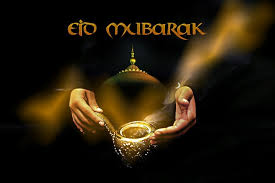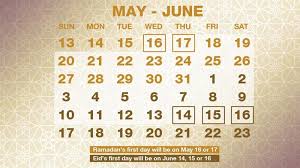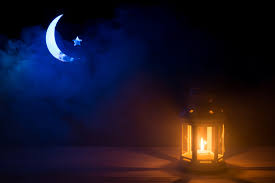By Rifath Islam
So we’ve come full circle and it’s that time of the year again, Ramadan!
For those unfamiliar with it, Ramadan is the ninth month in the Islamic calendar. Ramadan is observed by Muslims worldwide as a month long holiday during which they fast from sunrise to sunset. It formally commemorates the revelation of the Qur’an to the Prophet Muhammad.
Scheduled to begin on May 15th in the United States this year, the actual dates when Ramadan is officially celebrated depends on moon sightings—in this case the crescent moon. The crescent moon is often misunderstood by non-Muslims as signifying a worship of “Allah the moon god” due to frequent use of the moon’s image in Islamic culture, such as Islam’s iconic symbol of a crescent moon and star. However, the moon serves no purpose in Islam other than to calculate the lunar calendar. In fact, there are verses in the Qur’an which serve to prove that the moon is not to be worshipped, but rather to be used for assistance in telling time.
The holy month of Ramadan is one of the Five Pillars of Islam, and is celebrated to cleanse Muslims of their sins. It is known that during this time, the gates of heaven, Jannah, are opened and those of hell, Jahannam, are closed, locking up the devil, Shaytaan, for those 30 days. The 30 days of this holiday are also separated into three different categories contemplated by believers which are known as Ashra’s. The first ten days of observance are intended for mercy from Allah, the second ten days for the forgiveness of Allah, and the last 10 days for protection from hell, or Jahannam. The acceptance of Muslims’ fasts during this month are usually marked by a mandatory donation to charity, known as Zakat (another of the Five Pillars).
Ramadan is also more than just fasting and asking for forgiveness from Allah. It is intended to improve not only one’s morality, but also one’s character. People attempt to increase their own positive thoughts and traits during this time, and go often to mosques to pray and worship.
A commonly asked question during this time from non-Muslims is “Aren’t you hungry?” or “You can’t eat anything?” The answer is yes and no, respectively. While it is true that fasting is a difficult and hunger-inducing tradition, the hunger that ensues serves as a constant reminder as to why Muslims are fasting.
A regular day of fasting for Muslims lasts from sunrise to sundown. At sundown, usually marked by Maghrib prayer, families gather to break their fast, a gathering that is known as Iftaar (which translates exactly to “break fast”). Tradition during this time is to break fast with a date (fruit), while uttering an invocation, or dua, which is a reminder to all Muslims that every action they take is that which seeks the pleasure of Allah.
While the sighting of the crescent moon indicates the beginning of Ramadan, the sighting of the full moon signals the start of Eid al-Fitr, which is the celebration of the end of Ramadan. Eid al-Fitr is the start of the Islamic month Shawwal and can last three days long in some countries. Eid al-Fitr is celebrated in the form of a feast, (not to be confused with Eid ul-Adha which is a sacrificial feast in honor of Prophet Ibrahim being willing to sacrifice his son to Allah as an act of obedience.)
For those celebrating Ramadan this year, may forgiveness and blessings be showered upon you and your family during this holy month.


